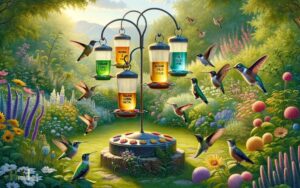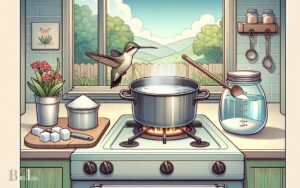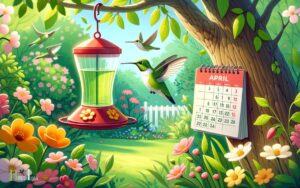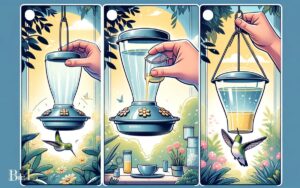Can You Use Distilled Water for Hummingbird Food? Yes!
Yes, you can use distilled water for hummingbird food. It is a safe and suitable option for making the sugar-water solution that feeds these birds.
When preparing hummingbird food, which typically consists of a sugar-water solution, the purity of water is a factor to consider. Distilled water is free from minerals and impurities that may be present in tap water.
This makes distilled water an excellent choice for making hummingbird nectar, as it ensures that the food is clean and safe for the birds to consume.
- Distilled water is pure and does not contain chlorine or fluorine found in tap water.
- Using distilled water prevents the potential for contaminants that might harm the hummingbirds.
- It may extend the shelf life of the nectar due to the absence of organic materials.
Choosing distilled water for hummingbird nectar supports the well-being of these vibrant birds by providing them with the purest form of hydration.
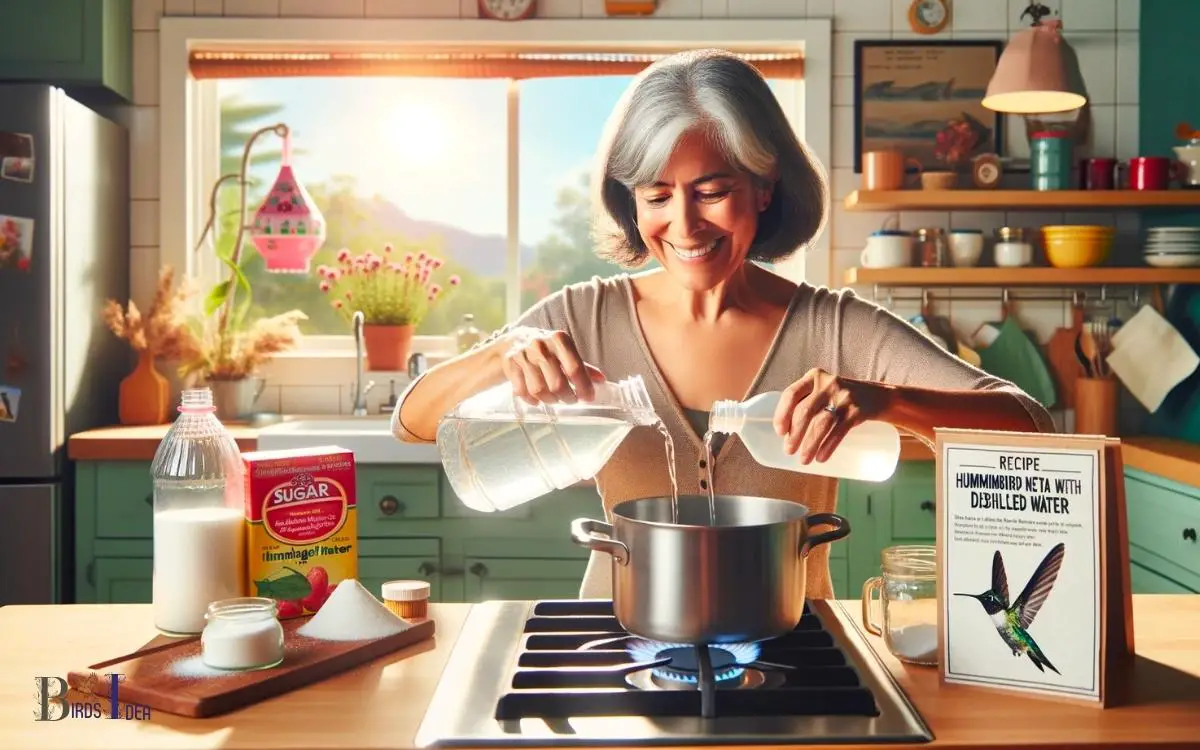
Key Takeaway
The Importance of Water Quality
Ensuring high-quality water is crucial for the health and well-being of hummingbirds. These delicate creatures heavily rely on clean water for drinking and bathing.
Poor water quality can lead to various health issues in hummingbirds, including dehydration, reduced immune function, and digestive problems.
As individuals who are dedicated to serving these beautiful birds, it is our responsibility to provide them with the best possible care, which starts with the water we offer them.
By prioritizing water quality, we can contribute to the overall well-being and longevity of hummingbirds in our vicinity.
Why Use Distilled Water for hummingbird food?
Distilled water is water that has undergone a process called distillation, which involves boiling water and then condensing the steam back into liquid form.
This process effectively removes impurities, minerals, and contaminants from the water, resulting in a purified product. Distilled water is considered one of the purest forms of water available.
When it comes to making hummingbird food, which typically consists of a simple sugar solution, using distilled water is recommended for several reasons:
Purity
Distilled water is free from minerals, salts, and other impurities that might be present in tap water or other water sources.
This ensures that the hummingbird food is as clean and pure as possible, reducing the risk of contaminants that could be harmful to hummingbirds.
Preventing Mineral Buildup
Hummingbird feeders have small openings through which the sugar solution flows. Using distilled water helps prevent mineral buildup in these openings, as there are no minerals present to precipitate out of the solution and clog the feeder.
Minerals in tap water can leave deposits as the water evaporates, leading to potential blockages.
Health of Hummingbirds
Hummingbirds are sensitive creatures, and their well-being is influenced by the quality of the food they consume.
Providing them with a sugar solution made with distilled water ensures that they are not exposed to potentially harmful substances that may be present in untreated water.
Avoiding Chemicals
Tap water may contain chlorine, fluorine, or other chemicals used in water treatment. While these are generally safe for human consumption, hummingbirds can be more sensitive to such chemicals.
Distilled water eliminates the presence of these additives, creating a safer environment for the hummingbirds.
To make hummingbird food with distilled water, you typically mix white granulated sugar with an equal amount of distilled water.
The simplicity and purity of this solution mimic the nectar found in flowers, which is the main source of nutrition for hummingbirds in the wild.
Using distilled water for hummingbird food helps ensure the purity and cleanliness of the sugar solution, promoting the health and well-being of these tiny and delicate birds.
Distilled Water Vs. Tap Water
High-quality water is essential for the health and well-being of hummingbirds, and when considering the comparison between distilled water and tap water for hummingbird food preparation, it is important to evaluate their respective benefits and potential drawbacks.
The table highlighting the differences between distilled water and tap water for making hummingbird food:
| Criteria | Distilled Water | Tap Water |
|---|---|---|
| Purity | Very high; free from minerals and impurities | Variable; may contain minerals and impurities |
| Mineral Buildup | Minimal risk; less likely to cause deposits | Risk of mineral deposits leading to clogs |
| Chemical Additives | Absent; no chlorine or fluorine | May contain chlorine, fluorine, or other additives |
| Hummingbird Sensitivity | Safe; no potentially harmful substances | Potential sensitivity to chemicals in tap water |
| Health Impact on Hummingbirds | Provides a cleaner and safer source of hydration | May expose hummingbirds to impurities and chemicals |
| Feeder Maintenance | Reduced likelihood of mineral buildup | May require more frequent cleaning and maintenance |
| Convenience | Readily available for purchase | Readily available from the tap |
It’s important to note that while distilled water is often recommended for making hummingbird food, some sources suggest that tap water, especially if it’s of high quality and doesn’t contain harmful additives, may also be acceptable.
However, using distilled water provides an extra level of assurance regarding the purity of the hummingbird food.
Effects on Hummingbird Health
How does the absence of essential minerals in distilled water impact the overall health of hummingbirds when used in their food preparation?
- Nutritional Deficiency: Distilled water lacks essential minerals that hummingbirds need for their overall health and well-being, potentially leading to nutritional deficiencies.
- Electrolyte Imbalance: The absence of minerals in distilled water may cause electrolyte imbalances in hummingbirds, affecting their hydration levels and overall physiological function.
- Impact on Metabolism: Essential minerals play a crucial role in the metabolic processes of hummingbirds. The absence of these minerals in their water source could negatively impact their metabolism and energy levels, potentially affecting their ability to forage and thrive.
It is essential to consider the potential effects of using distilled water in hummingbird food preparation to ensure the health and vitality of these delicate creatures.
Nutritional Considerations
The absence of essential minerals in distilled water can have significant implications for the nutritional content of hummingbird food, potentially impacting their overall health and well-being.
Hummingbirds require a diet rich in natural nectar, which provides essential nutrients such as sucrose, glucose, and fructose.
When preparing hummingbird food, using distilled water may result in a lack of minerals that are crucial for the birds’ dietary needs.
Minerals like calcium, potassium, and magnesium, which are naturally found in water sources, play a vital role in supporting the birds’ metabolism and overall health.
Therefore, using distilled water for hummingbird food may compromise the nutritional value that these tiny creatures rely on for their energy and well-being.
It’s important to consider the complete nutritional profile of the food and the water used to ensure the best care for these beloved birds.
Environmental Impact
Understanding the environmental impact of using distilled water for hummingbird food requires considering the potential implications on local ecosystems and water resources.
The use of distilled water may have several environmental implications:
- Water Waste: The production of distilled water requires a significant amount of energy, which in turn contributes to carbon emissions and environmental pollution.
- Resource Depletion: The process of distillation removes minerals and nutrients from water, leading to potential depletion of essential elements in the ecosystem where the water is sourced.
- Disposal Concerns: Improper disposal of distilled water can harm local water bodies and aquatic life, as the lack of minerals in distilled water can disrupt the balance of the ecosystem.
Considering these factors, it’s important to weigh the environmental impact when deciding whether to use distilled water for hummingbird food.
What Are the Benefits of Using Distilled Water for Hummingbird Food?
Using distilled water for hummingbird food offers several benefits. Firstly, it eliminates the risks associated with using tap water, as it removes potentially harmful minerals and chemicals. Additionally, plain water in hummingbird feeders prevents the growth of bacteria and fungi, ensuring the health and well-being of the birds. By opting for distilled water, you provide a pure and safe hydration source for these delightful creatures.
Best Practices to Use Distilled Water for Hummingbird Food
To ensure the best practices for using distilled water in hummingbird food preparation, consider the following guidelines:
- Purchase Quality Distilled Water: Choose distilled water from reputable sources to ensure its purity and absence of contaminants.
- Clean Containers: Use clean containers and utensils when preparing hummingbird food to avoid introducing impurities.
- Proper Mixing Ratios: Follow the recommended ratio of white granulated sugar to distilled water (usually 1:1) to create a solution that closely resembles natural nectar.
- Thorough Dissolving: Stir the sugar thoroughly to ensure it completely dissolves in the distilled water, preventing any sugar crystals from forming in the solution.
- Avoid Additives: Do not add any food coloring, honey, or artificial sweeteners to the solution. Stick to a simple mixture of sugar and distilled water.
- Cool Before Use: Allow the sugar solution to cool to room temperature before filling the hummingbird feeder. This prevents any potential harm to the birds from hot liquid.
- Store Unused Solution Properly: If preparing a larger quantity of hummingbird food, store the unused solution in a clean, airtight container in the refrigerator for up to one week.
- Regular Feeder Cleaning: Clean the hummingbird feeder thoroughly and regularly, ideally every 3–4 days, to prevent the growth of harmful mold and bacteria.
- Inspect for Contaminants: Before refilling the feeder, inspect the solution for any signs of contamination, such as cloudiness or debris.
- Monitor Hummingbird Activity: Pay attention to the frequency of hummingbird visits to the feeder. If there is a sudden decline, it may be an indication of contamination or spoilage in the food.
- Protect from Pests: Place feeders in locations that minimize exposure to ants and other pests. Ant moats or traps can be used to deter crawling insects.
By adhering to these best practices, you can create a safe, nutritious, and appealing environment for hummingbirds, promoting their health and enjoyment in your outdoor space.
Conclusion
The choice of water for hummingbird food can have a significant impact on their health and well-being.
It is important to consider the potential effects of using distilled water versus tap water, as well as the nutritional and environmental implications.
By making informed choices about the quality of water used in hummingbird food, we can help ensure the health and preservation of these remarkable creatures.

